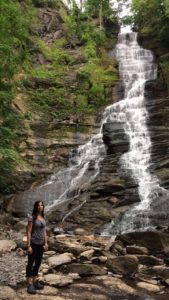We are pleased to offer the next installment in our series that features the outstanding and interesting students in our program. This month, we feature Earth Sciences PhD student Kristina Gutchess. Thank you for contributing, Kristy!

What inspired you to become a geoscientist?
I have had an insatiable interest in the earth sciences since I was a young child. Every summer I would spend endless hours constructing makeshift dams and culverts with my brother in a small creek that ran through my childhood back yard. This early love for understanding the science of the earth – particularly water – has since propagated, and here I am today.
What skills and knowledge (either educational or technical training) have been of key importance to your success in graduate school
So much has contributed to my growth as a scientist! But if I had to pick the top three, I would say:
1) Learning programming early on
2) Taking advantage of a variety of courses (many outside of the earth sciences department)
3) Developing a strong interdisciplinary network.
Oh, and last but not least, communicating! Regularly presenting and meeting with peers and colleagues to discuss science, either formally or informally, has been of key importance in the development and advancement of my research.
Do you have any mentors who have helped guide you? What is some pivotal advice that they have given you?
Dr. Laura Lautz, EMPOWER Program Director and Earth Sciences Department Chair, has always been a role model of mine. As an undergraduate, I admired Dr. Lautz’s work with beaver dams and nutrient dynamics. I’ve had the privilege to interact with Laura regularly during my graduate studies and she still inspires me daily. Working closely with Dr. Laura Lautz has shown me the importance of perseverance, organization, and the benefits that a positive outlook even when faced with insurmountable challenges can have.
My advisor, Dr. Zunli Lu, has also been a strong driving force since I started considering graduate studies as an undergraduate. He even had a hand in recruiting me to apply to Syracuse. Since I’ve been here, Zunli has helped me realize what I’m capable of. He pushes the graduate students in our research group to go above and beyond – and we’re all incredibly grateful for that!
What advice would you give new graduate students
- Embrace your inner “nerd.”…don’t be afraid to totally immerse yourself in the science. The rest will follow.
- Don’t underestimate the importance of skilled science communication – if only 1% of your audience can understand you, what’s the point?
- Be yourself! Grad school isn’t just about finding the answers to complex scientific questions. It’s also an opportunity to explore your interests in depth– to really figure out the direction you want your career to take and to thoroughly evaluate all your options.
About Kristy: Kristy graduated from State University of New York College at Cortland with a B.S. in Geology. She participated in several interdisciplinary research projects as an undergraduate, including characterizing contamination in urban catchments, assessing water quality on the college campus, and assessing the extent of nutrient pollution in Central New York tributaries. Kristy’s research is aimed at broadening understanding of the controls on the flux of water and solutes through catchments. To answer these questions, she uses modeling approaches combined with field observations and analytical techniques. She also is interested in the impacts of climate disruption on headwater catchments and the societal and ecological ramifications of these changes. Kristy has extensive teaching experience, has earned awards for her research, and has numerous publications. She has been awarded Syracuse University Water Fellowship and the EMPOWER NRT fellowship.